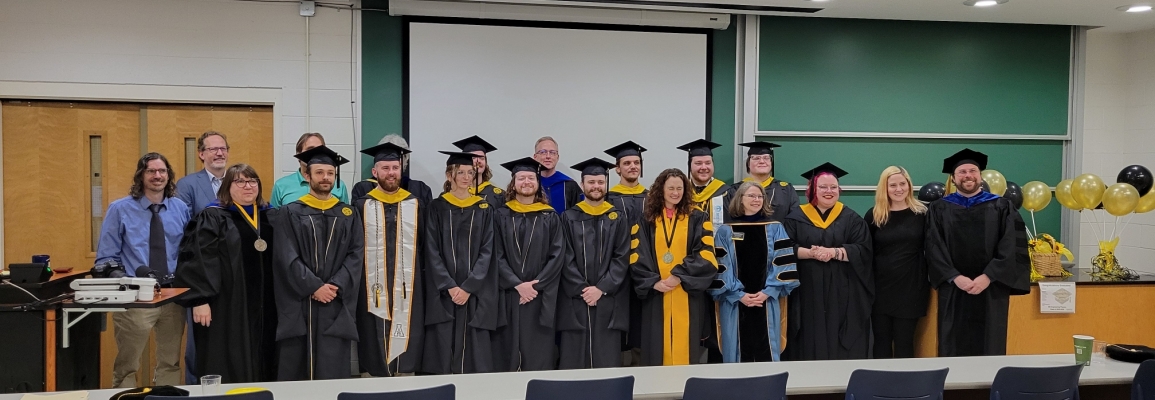How to Apply
Considering physics at Appalachian? Here are a few useful links for prospecting students:
Undergraduate Majors
The Department of Physics and Astronomy offers one Bachelor of Arts (BA) degree and six Bachelor of Science (BS) degrees with concentration options, including a secondary education concentration with teaching licensure.
Physics (BA)
Physics (BS) - Applied Physics
Physics (BS) - Astronomy
Physics (BS) - Automation and Instrumentation
Physics (BS) - Interdisciplinary Science
Physics (BS) - Secondary Education
Undergraduate Minors
Astronomy Minor
Medical Physics Minor
Physics Minor
Physics Minor for Secondary Education Majors
Undergraduate Emphasis Options
Major program tracks in the Department of Physics & Astronomy include:
- B.S. in Physics with a concentration in Applied Physics
- B.S. in Physics with a concentration in Astronomy
- B.S. in Physics with a concentration in Automation & Instrumentation
- B.S. in Physics with a concentration in Interdisciplinary Science
- B.S. in Physics
- B.S. in Physics - Secondary Education
- B.A. in Physics
- Pre-engineering for students interested in transferring
- A dual-degree with North Carolina State University
Along with the basic requirements for our undergraduate degree options, students have the opportunity to select emphasis areas including, among others, the topics listed below (check the emphasis options link for a full list).
- Astronomy
- Automation and Instrumentation
- Interdisciplinary: Chemistry Focus
- Interdisciplinary: Computer Science Focus
- Interdisciplinary: Geology Focus
- Interdisciplinary: Mathematics Focus
- Interdisciplinary: Statistics Focus
- Interdisciplinary: Medical Physics
- Interdisciplinary: Biology Focus
Graduate Degree
Engineering Physics: Master of Science (MS)
The program offers three concentrations:
Professional Science Master’s (PSM) in Instrumentation and Automation – A nationally-affiliated degree designed for the student who is interested in developing skills in electronics, instrumentation and automation as well as acquiring business and workplace skills.
Professional Science Master’s (PSM) in Nanoscience for Advanced Materials – A nationally-affiliated degree designed for the student who is interested in developing skills in electronics, microscopy, nanotechnology and materials as well as acquiring business and workplace skills.
Systems and Laboratory Automation – A degree designed for the student who is interested in working in a technical environment with a focus on automation, instrumentation and electronics.
Graduate Minor
Engineering Physics Graduate Minor
Accelerated Master's Program
The Accelerated Master's program allows students to obtain both a BS in Physics and an MS in Engineering Physics in as little as five years. Students with 90 credit hours (typically completed by the end of sophomore year) and a minimum GPA of 3.2 are eligible to be nominated for the program. In the last two years of study, students take 12 credit hours of graduate level coursework counting toward both the BS and MS degree, allowing them to complete the MS degree in just one additional year.
Accelerated Master's students complete an undergraduate degree in physics, typically with an emphasis in electronics and automation. Upon entry into the MS program students have the option to focus on an MS in systems and laboratory automation, or a PSM in either instrumentation and automation or nanoscience for advanced materials. Both the BS and MS program are nationally ranked by the American Institute of Physics (AIP) as one of the largest physics programs in the country. Despite being a large program, faculty in the Physics and Astronomy Department still work individually with students outside the classroom to help them with their coursework, engage in community outreach, and on faculty led research projects.
Our MS Engineering graduates tend to have tremendous flexibility and value as they bridge the gap between scientists, engineers, and technicians. Students have been hired as electrical engineers and automation engineers at companies such as Verizon, the Naval Research Center, Gemini South Observatory, Rovisys, Fast Enterprises, CITI, SpaceX, Exxon Mobil, NASA, CERN, Motorola, AT&T, and others. The American Physical Society (APS) reports that MS graduates earn on average $15k more a year. Over the last several years, our MS graduates average a $73k starting salary.
